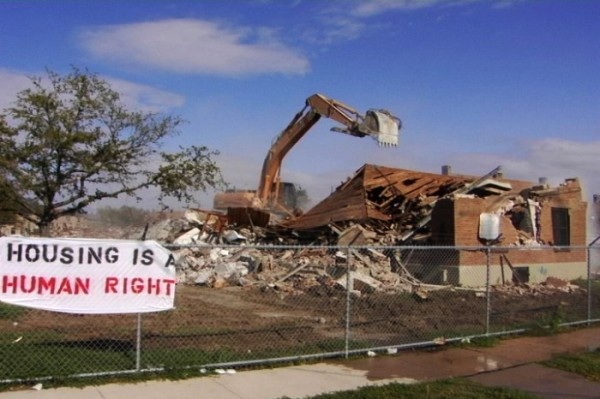Settlement reached in Supreme Court "fair housing" discrimination/Negro removal case
/From [HERE] The US Supreme Court will not hear a case regarding racial discrimination in home sales and rentals after the matter was settled out of court on Wednesday. Originally scheduled for oral argument December 4, the case of Mount Holly v. Mt. Holly Gardens Citizens in Action, Inc. presented the issue of whether disparate impact claims are cognizable under the Fair Housing Act. The Fair Housing Act [text] makes it unlawful "[t]o refuse to sell or rent after the making of a bona fide offer ... or otherwise make unavailable or deny, a dwelling to any person because of race, color, religion, sex, familial status, or national origin." Petitioners sought to redevelop a blighted housing development that was disproportionately occupied by low and moderate income non-white people. The redevelopment sought to replace the blighted housing with new market rate housing which was unaffordable to the current residents within the blighted area. Wednesday evening, the local government in the New Jersey community agreed to settle the case. The Township Council voted unanimously to adopt resolutions concluding the case. Both sides will withdraw their case in court, an automatic result upon settlement.
In the settlement Wednesday, the township agreed to provide homes to the 20 residents and compensate seven other homeowners who have chosen to leave the community. Both sides agreed to drop all legal proceedings.
Current residents of the Gardens will have the right to remain in their home community while the houses are built. The 44 homes will be developed by TRF Development Partners Inc. of Philadelphia.
If Township of Mount Holly v. Mount Holly Gardens Citizens had gone before the Supreme Court, the justices would have been asked to decide whether Mount Holly had effectively discriminated against the predominantly Hispanic and African American residents who populate the Gardens when it condemned their homes in 2003 as part of a redevelopment plan.

First raised under the 1968 Fair Housing Act, the principle of disparate impact holds that developers and municipalities may not undertake redevelopment plans - especially condemnations - that adversely impact minority groups even if those actions are not intentionally prejudiced.
The US Court of Appeals for the Third Circuit had previously reversed the district court's decision when it found [opinion] that the respondents presented a prima facie case under the Fair Housing Act despite the fact that there was no evidence of discriminatory intent and no segregative effect. The Supreme Court granted certiorari to hear the case in June.














































































































































































































































































